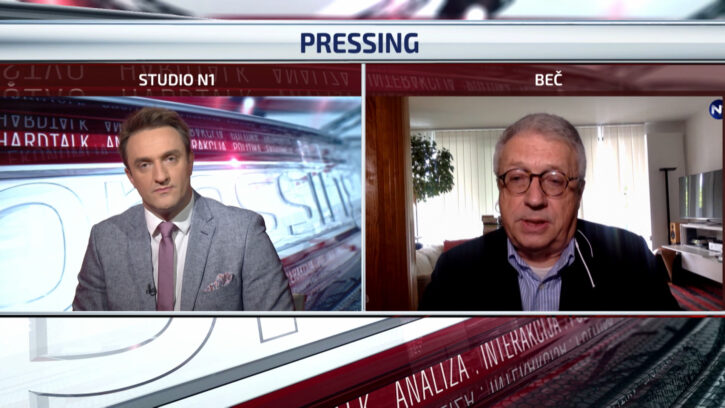
The international community's High Representative in Bosnia and Herzegovina still has the special powers with which he can impose laws and decisions in the country, but the geopolitical situation has changed significantly, and we need new methods of solving Bosnia's problems, the former High Representative Wolfgang Petritsch told N1's Amir Zukic.
“I'm sorry for my friend Valentin Inzko (the incumbent High Representative) who is unable to do anything because he lacks the support from Brussels, Washington and Moscow who are using him for their own goals,” Petritsch said, adding that the plan was to close the Office of the High Representative (OHR) in 2006, but the conditions for its closure were never met, and now it cannot do anything else but project hope to those who still believe in it.
The OHR was set in place by the international community with a task of institutionally overseeing the peace implementation process and respect of the Dayton Peace Agreement that ended the 1992-1995 Bosnian war.
They then decided to give the head of the Office, the High Representative, powers called the Bonn Powers with which they could impose new laws, decisions and even sanction politicians who were not abiding by the Dayton Agreement.
“The OHR is a post-war institution. I don't believe the Bonn powers could be used today. You need a strong military component to be able to use the Bonn powers,” he noted, implying that EU forces (EUFOR) deployed to implement the military aspect of the Dayton Agreement, are unable to support the High Representative's decision because their number is only a fraction of what it used to be.
Petritsch argued that the Bonn powers are not the way Bosnia should solve its problems today and that it must become a country that can resolve its own issues.
Speaking about the Russian influence in Bosnia, Petritsch noted that the Bosnian Serb leader and the Chairman of Bosnia's tripartite Presidency, Milorad Dodik, used to meet the Russian President Vladimir Putin more than he met with the German Chancellor Angela Merkel when he was the President of Bosnia's Serb dominated Republika Srpska region.
“Putin has access to the EU through Bosnia but also through France and its Marie Le Pen. I believe this is an existential threat and it's not helpful that a country like Bosnia that was financed by the EU for the past 25 years, is now behaving in an anti-European way,” the former international community's official said for N1.
However, in case that right-wing parties take hold of Europe, Petritsch said it would mean the end of the European project.
Even today it is difficult to convince the authorities in the Hague or Paris to leave the EU doors open to the Western Balkans, he noted, adding that Bosnia is behind on its EU reforms and its politicians are not trying to make it go faster on its EU path.
“I do not see the will and joint effort in Sarajevo to bring Bosnia closer to the EU. Unfortunately, I have a feeling that even Kosovo is making faster progress. Serbia and Montenegro are making better progress in negotiations with Brussels. This hurts me, personally, because I don't see the political will in Sarajevo, of making Bosnia part of the European unity,” Petritsch concluded.
When asked about the region's NATO perspective, the Austrian diplomat said that region's NATO accession would mean the first step towards the consolidation of the security situation in the Western Balkans.




